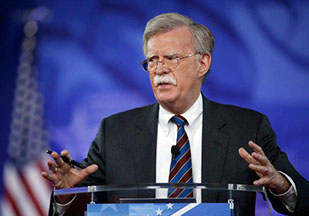WASHINGTON, (Reuters) – U.S. President Donald Trump increased economic pressure on Venezuela’s leftist President Nicolas Maduro yesterday with new sanctions aimed at disrupting the South American country’s gold exports.
Trump signed an executive order to ban anyone in the United States from dealing with entities and people involved with “corrupt or deceptive” gold sales from Venezuela, Trump’s national security adviser John Bolton said in a speech in Miami.
“The Maduro regime has used this sector as a bastion to finance illicit activities, to fill its coffers, and to support criminal groups,” Bolton said.
Bolton made the announcement as part of a pledge to crack down on what he called “the troika of tyranny” in the western hemisphere, naming Cuba, Venezuela and Nicaragua.
Miami is home to large numbers of immigrants from Cuba and Venezuela. Bolton made his appearance there just days before U.S. congressional elections that include close races for a Senate seat and the governorship in Florida.
Bolton’s remarks were likely to be well received by those Cuban-Americans and other Hispanics in Florida who favour stronger U.S. pressure on Cuba’s Communist government and other leftist governments in Latin America.
Bolton spoke at Freedom Tower – a building where Cuban refugees were welcomed in the 1960s following Fidel Castro’s revolution – a day after Trump campaigned in Florida for Republican candidates.
Florida has traditionally been a swing state and former President Barack Obama was scheduled to rally Democrats in Miami on Friday ahead of the Nov. 6 elections.
Bolton said Cuba is aiding Maduro’s government in Venezuela, referring to the close ties between the two countries since Maduro’s predecessor, Hugo Chavez, came to power in 1999.
Trump has taken a harder line on Cuba after Obama sought to set aside decades of hostility between Washington and Havana. He has rolled back parts of Obama’s 2014 detente by tightening rules on Americans traveling to the Caribbean island and restricting U.S. companies from doing business there.
Bolton said the U.S. State Department would “within days” add more than two dozen entities to a list of Cuban organizations associated with country’s military and intelligence services. U.S. persons and companies are banned from doing business with the restricted companies.
He said the administration would review whether to allow U.S. citizens whose property was seized by the Castro government to sue foreign companies that have invested in the properties in Cuba. The review, requested by a group of Republican lawmakers from South Florida, was first reported by McClatchy.
“We want to look at this question with a fresh set of eyes,” Bolton said.
Bolton also singled out Nicaragua for criticism over leftist President Daniel Ortega’s crackdown on political opponents, saying its government “will feel the full weight of America’s robust sanctions regime” with measures coming “in the very near future.”
Almost 2 million Venezuelans have fled since 2015, driven out by food and medicine shortages, hyperinflation, and violent crime. Thousands have made their way to south Florida.
Maduro, who denies limiting political freedoms, has said he is the victim of an “economic war” led by the United States.
Venezuela this year turned to gold as a way to receive desperately-needed hard currency, exporting 23.62 tonnes of gold worth $900 million to Turkey in the first nine months of the year, compared with zero in the same period last year, official Turkish data showed.
In 2016, Maduro declared war on illegal miners and declared gold a strategic priority in an effort to spur production in the so-called ‘Mining Arc’ to create an alternative source of revenue for the oil-dependent economy.
Critics and opposition leaders say this decision has in fact led to a surge in wildcat mining and violence, with the government reaping the benefits of illegal gold production.
The country’s gold revenues remain small compared to the OPEC member’s oil sector, which accounts for over 90 percent of export revenue.
The Trump administration had threatened sanctions on Venezuela’s oil industry, but a senior U.S. official said this month there is less need to target the energy sector given that it is unraveling under Maduro-appointed military officials.
Analysts say higher oil prices and a desire to protect U.S. Gulf Coast refiners have also weighed on Washington’s decision.
Early in his presidency, Trump briefly spoke about a “possible military option” for Venezuela, without providing details.
Bolton brushed off a question about whether Trump would consider interventions other than stepped-up sanctions.
“I don’t see that happening in part because I am very firmly of the view that as the sanctions torque up, the pressure will become unbearable,” Bolton said.

